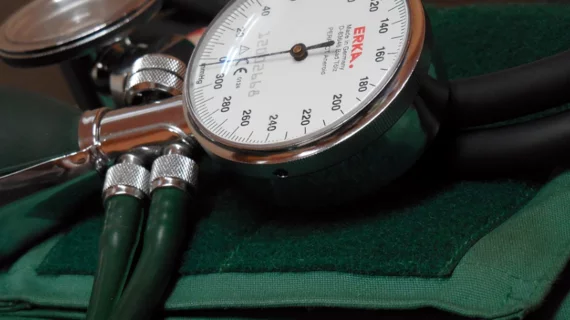Beta hydroxybutyrate—a ketone body produced in the liver—could be key to regulating hypertension in heart patients who aren’t able to exercise, according to research out of the University of Toledo.
The lead author of the Cell Reports study, a fourth-year PhD student named Saroj Chakraborty, and co-authors said hypertensive patients are often instructed to reduce their salt intake and join a gym to mitigate their high blood pressure, but that’s not always feasible. For some, exercise just isn’t an option, or it’s difficult to incorporate into their lifestyle.
Enter beta hydroxybutyrate, a chemical born from the metabolism of fatty acids in the liver. It’s never been studied before in relation to hypertension, but Chakraborty and his team said their prior research suggested there could be a tie.
“As we searched through the literature we saw beta hydroxybutyrate has been observed increasing with exercise or calorie restriction,” Chakraborty said in a UT release. “Both of those activities also reduce blood pressure.”
The UT researchers tested the chemical in lab rats by feeding them a dose of 1,3-butanediol, which converts to beta hydroxybutyrate when it reaches the liver. From the liver, the chemical made its way to the rats’ kidneys, where it lowered inflammation triggered by hypertension.
The lowest levels of beta hydroxybutyrate were found in rats with the greatest salt intake, suggesting higher levels of sodium counter healthy production of the chemical. When Chakraborty et al. infused those rats with a heftier dose of beta hydroxybutyrate, their blood pressure levels were restored to normal.
“The key piece of our discovery is we now know that beta hydroxybutyrate decreases with salt consumption,” Chakraborty said. “This is a novel mechanism by which salt is tied to an increase in blood pressure.”
The idea is a new one for researchers, and the team at UT has received a provisional patent for the concept. Chakraborty said next steps include figuring out how much 1,3-butanediol is needed to modulate blood pressure and whether the chemical might adversely affect any major organs, like the heart, blood vessels or brain.
For now, he said, he and his colleagues have an opportunity to control salt-sensitive hypertension without the requirement of working out. The future of exercise, theoretically, could be contained to a pill no more than a few millimeters in diameter.
“There are certain patients who are not able to exercise for various reasons,” Chakraborty said. “This could prove to be a legitimate alternative for those individuals.”

